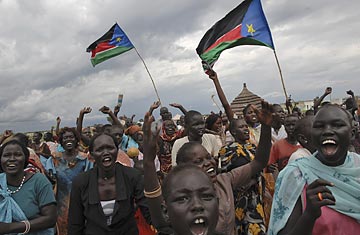
Residents of Abyei celebrate the Permanent Court of Arbitration's decision to resolve the north-south boundary dispute
Even though Sudan's civil war officially ended four years ago, tensions continued to fester between the country's north and south over a region rich in oil and symbolism. But on Wednesday, an international panel decided to shrink the borders of the disputed Abyei region, a move that may strengthen Sudan's fragile peace.
The Permanent Court of Arbitration's remapping of the Abyei region reduces its size by more than a third. The new borders award several major oil fields to the north Sudanese government of President Omar al-Bashir but also make it more likely that the region will become part of south Sudan when the people of Abyei vote on their future in 2011.
Officials from Bashir's government called the Hague-based court's decision a step in the right direction, while south Sudanese leaders said it was acceptable. "We want peace, [and] we think this decision is going to consolidate the peace," said Riek Machar, a leader of the Sudan People's Liberation Movement, which fought against the north in the 22-year civil war that killed 1.5 million people. "We came to see justice, and it's a decision we will respect."
In 2005, when the north and south signed the Comprehensive Peace Agreement (CPA) that ended the war, they could not agree on the fate of Abyei, a region that sits along the hazy border and is home to several oil fields and an oil pipeline. In a bid to settle the dispute, negotiators drew up clear boundaries for Abyei, put it under joint administration and planned a 2011 referendum for its people to decide their region's fate.
But the north rejected that decision, threatening the peace deal. The region's most important city, also called Abyei, saw fighting last year that killed dozens of people and forced some 60,000 from their homes. Abyei also came to be seen locally as a symbol of the entire peace process: as goes Abyei, so goes the conflict.
In a bid to salvage the CPA, the two sides agreed to ask the Permanent Court of Arbitration, essentially a stop of last resort for disagreements that can't be solved elsewhere, to determine if the earlier ruling on Abyei's boundaries was correct. Making its ruling on Wednesday, the court issued a 286-page document that, while heavy on legalistic language justifying its decision to redraw Abyei's borders, seemed to be a fairly straightforward political compromise.
"Because I've always assumed that judges are impartial and neutral, I would say it's not a political compromise, but it is certainly in line with compromises that have been imposed in the past," says Douglas Johnson, a Sudan scholar who has advised the south Sudanese and who was in the original group of experts that determined Abyei's boundaries. "By excluding [some of] the oil fields, it removes the main objection that Khartoum had to this."
The south may have gotten what it wanted too. For one thing, independent experts — including the International Crisis Group — say that the oil fields now falling to the north are nearly depleted, and the south has many others within its borders anyway. For another, the new boundary excludes several towns from Abyei that are mostly inhabited by Arabs. This means that when Abyei holds its referendum in 2011 on whether to join the north or the south, it will more likely go to the south — Arabs are allied with the north, while the Dinka tribesmen who make up the rest of Abyei's population will almost certainly vote to join the south.
All well and good, but few people are getting their hopes up that the Abyei deal is anything more than a tiny step. The north and south still disagree on a host of other issues. South Sudanese are losing faith in their own leaders, who are seen as corrupt. And looming in the background are nationwide elections in 2010 and then a 2011 referendum — to be held concurrently with the Abyei vote — in which south Sudanese will decide whether to remain a part of Sudan or become a separate country.
"While Abyei is the focus of everyone's attention today, it's only one of a host of contentious issues that the parties are facing, not least of which is the demarcation of the entire north-south border, which has many other oil fields," says Colin Thomas-Jensen, a policy adviser at the Washington-based Enough Project, who has written extensively on Sudan. "We've seen a lot of rhetoric and commitments on both sides, and that's positive. But there's a history in this region of saying one thing and doing another."
